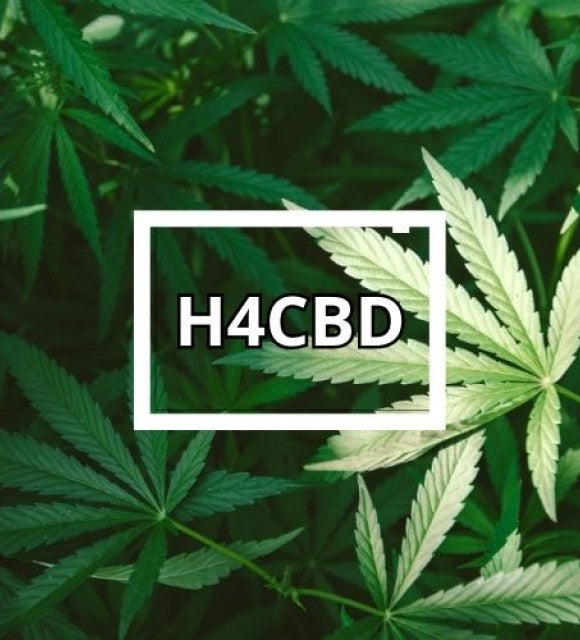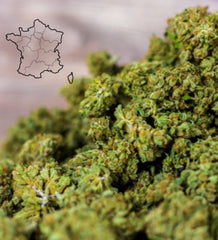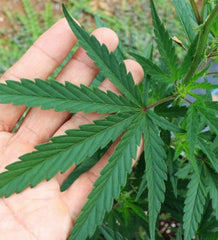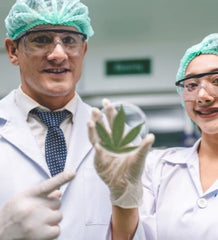
H4CBD: definition, effects, legal status and differences with CBD
What is H4CBD?
Contrary to popular belief, H4CBD is not a newly discovered molecule. Let's travel back to 1940, in the midst of World War II, in the laboratory of Professor AR Todd. This is where H4CBD was first synthesized following a hydrogenation process. Basically, it's like adding a little spice to a recipe. In this case, it involved injecting hydrogen atoms into the cannabidiol (CBD) molecule.
This genesis earned the "new" molecule several somewhat barbaric names such as HHCBD, CyclohexylCBD, or even simply "hydrogenated CBD." This jargon-filled nomenclature will gradually be replaced by H4CBD.
The H4CBD story doesn't end there. In 2006, a team of researchers led by Shimon Ben-Shabat discovered that H4CBD had a particular affinity with the "CB 1" receptor of our endocannabinoid system, particularly in the brain. Another study published in 2017 confirmed this affinity. One figure has even been put forward: H4CBD is up to 100 times more "potent" (in terms of affinity with the "CB 1" receptor) than CBD.
How is H4CBD, a synthetic cannabinoid, produced?
So, where does this mysterious H4CBD come from? How do we go from the CBD we all know to this "mutant" molecule? Here's a look at the steps involved in this transformation:
- Obtaining CBD : It all starts with CBD, which can be extracted from the cannabis plant or created in a lab from another cannabinoid or phytocannabinoid. Sophisticated extraction methods such as solvent, alcohol, or supercritical CO2 extraction will be used to obtain this molecule;
- Hydrogenation reactions : Next, the CBD undergoes a series of chemical reactions to add additional hydrogen atoms. It's a bit like adding pearls to a necklace. These reactions are carried out with specific catalysts and under precise conditions of temperature, pressure, and pH (acidic environment);
- Purification : After hydrogenation, it's time to clean things up. Just like you would wash an apple before eating it, H4CBD must be purified to remove impurities and reaction residue. Separation and purification techniques, including chromatography and distillation, will be used here.
The synthesis of artificial cannabinoids like H4CBD is a job for skilled chemists, as it must be carried out in controlled and regulated environments.
H4CBD vs. CBD: How are they different?
CBD and H4CBD share several similarities: they both start with the hemp plant, specifically the Cannabis L. Sativa or Cannabis Indica varieties. They both interact with the endocannabinoid system of humans and mammals, primarily the "CB 1" and "CB 2" receptors. Their similar chemical structure gives them the same properties, but to varying degrees. These are primarily pain-relieving, anti-inflammatory, soothing, and antioxidant properties. But they differ in essential ways: H4CBD is psychotropic, CBD is not. Summary of the differences:
- Molecular structure : H4CBD has 4 more hydrogen atoms than the CBD molecule;
- Origin : CBD is naturally extracted from cannabis. H4CBD, on the other hand, is created in a laboratory. This is the difference between a natural substance and a synthetic molecule, produced in a laboratory, but from a natural molecule;
- Interaction with the endocannabinoid system : CBD is a little shy when it comes to interacting with “CB 1” receptors, while H4CBD seems to have a very high affinity for these receptors.
Is H4CBD legal?
That's the million-dollar question. As you probably already know, CBD is legal throughout Europe and other countries, and CBD products are available over the counter as long as they have a near-zero THC concentration (less than 0.3% in France). At the time of writing, H4CBD is also legal in France, but the ANSM has launched a series of experiments, the results of which are expected by the end of 2023. At Famous CBD, we predict an imminent ban.
In short, since H4CBD is not classified as a "narcotic," it is not prohibited, which makes it "legal." In the absence of specific regulations, it is at least tolerated, if not authorized. We are talking here about the legislation in France, because the legal status of the molecule can vary depending on the country.
H4CBD: Interest in science, not over-the-counter sales
To summarize, and before going into details, know this: H4CBD has a greater affinity with "CB 1" receptors than CBD, which gives it psychotropic effects and addictive potential. However, it remains much less "dangerous" than HHC and its derivatives, which have also been formally banned by the Ministry of Health following the opinion published by the ANSM in June 2023.
At Famous CBD, we believe H4CBD is a molecule of interest to the medical and scientific communities, like all cannabinoids. However, its psychotropic effects and addictive potential eliminate any commercial opportunity for over-the-counter sales to individuals.
Here's what you need to know about the potential therapeutic benefits of H4CBD:
- Affinity with endocannabinoid receptors: H4CBD shows a particular affinity for the “CB 1” receptors of the endocannabinoid system, mainly present in the brain and which seem to have a role in the modulation of pain and inflammation. This high affinity promises future applications in the treatment or, at least, the management of the symptoms of certain neurodegenerative diseases such as Parkinson’s and Alzheimer’s;
- Neuroprotective properties: some research suggests that H4CBD could exert neuroprotective effects, making the molecule interesting in the context of pathologies such as multiple sclerosis or Parkinson's disease;
- Modulation of anxiety and depression: The ability of H4CBD to interact with serotonin receptors could offer new perspectives in the management of anxiety and depressive disorders.
Having said this, it is necessary to emphasize the limitations and concerns that should alert us to the current legal status of H4CBD and the fact that the molecule is now available for sale over the counter in France:
- Psychotropic effect: H4CBD has a marked psychotropic effect, which raises ethical and regulatory questions regarding its availability over the counter. This effect can influence perception, mood and consciousness, and therefore requires careful control;
- Lack of clinical research: Although the therapeutic potential of H4CBD is promising, clinical studies are still ongoing. The lack of solid clinical data makes the regulation and commercialization of the molecule difficult;
- Interactions and Side Effects: The potential interactions of H4CBD with other medications and its possible side effects are not yet fully understood. Careful evaluation before any consideration for over-the-counter sale is therefore necessary;
- Addictive potential : Like all psychotropic substances that interact strongly with “CB 1” receptors (such as THC, THCP, THCV and HHC), H4CBD presents a risk of addiction.
Please note : Excessive consumption of H4CBD can lead to a cascade of adverse effects such as dehydration, profound torpor, headaches, nausea, dizziness, euphoria, and episodes of paranoia. It is strongly recommended not to drive in the hours following absorption of the molecule, as your reflexes will be significantly reduced while driving, not to mention the other side effects.
Why doesn't Famous CBD offer H4CBD?
This is a legitimate question we receive from time to time via live chat, email, social media, or customer support. After all, the molecule is legal, and we present ourselves as a leading supplier of hemp products in France.
At Famous CBD, we keep an eye on the entire spectrum of cannabinoids in the hemp plant, and the decision to market a molecule or not is made according to standards that far exceed legal obligations. We uphold our precautionary principle and rely on caution, because no compromise is allowed with the health and well-being of our customers. For all the reasons mentioned in this review article, we have chosen not to offer H4CBD-based products in our online store. Our vocation is to offer natural molecules with multiple virtues, not to offer powerful molecules that are more suited to pharmaceutical research laboratories.
We are not tempted by the lure of quick profit with understudied or controversial molecules. We prefer to wait for science to illuminate our path and/or for the law to decide. Our commitment is clear and unequivocal: to offer you safe cannabinoid products that truly enhance your quality of life and do not endanger your life or that of those around you.
We encourage our customers to share their questions or concerns about this or other cannabinoid products. Our team of experts remains at your disposal to provide you with clear, well-founded, sourced, and reasoned answers. In closing, we would like to reiterate that Famous CBD's mission is not limited to the sale of legal hemp products. It also encompasses education, transparency, and supporting producers who work hard to produce quality legal hemp.






